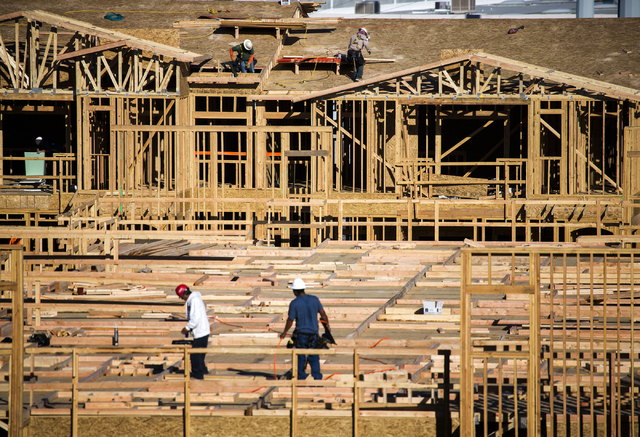Southern Nevada economy seen picking up pace


Southern Nevada’s economy is picking up its pace, and few hurdles stand in its way.
That’s the word from researchers with Brookings Mountain West, a division of the Metropolitan Policy Program at Washington, D.C.-based think tank Brookings.
Third-quarter numbers from Brookings Mountain West’s Mountain Monitor report show the Las Vegas Valley’s economy outperformed the national economy in nearly every indicator it measures, including job growth, gross metro product, unemployment declines and home-price gains.
Kenan Fikri, a senior policy analyst with Brookings’ Metropolitan Policy Program and a coauthor of the Mountain Monitor, traced part of Southern Nevada’s economic advance to the simple fact that it lost so much ground in the recession. When you lead the nation in job losses and home-price drops, your strides look longer when the economy improves.
But the valley is also lassoing strong national growth — U.S. gross domestic product expanded 3.5 percent in the third quarter — and benefiting from economic diversification, Fikri said.
“The tourism sector is bound up in the national economy and dependent on how everyone else is doing,” he said. “Since the national economy is doing well, Las Vegas’ core sector is riding that way.”
Yet, the city’s indicators didn’t merely match national growth — they exceeded it. That’s a sign that the local economy is enjoying a boost from sectors outside tourism and gaming, as state and local officials look to diversify Nevada’s jobs base, Fikri said.
Gov. Brian Sandoval in 2011 announced a statewide office on economic development, as well as several regional diversification authorities, to attract businesses in sectors including aerospace, manufacturing, health care and information technology. Brookings researchers helped the state craft its diversification strategy.
“The Las Vegas recession was a cataclysmic, once-in-a-generation event, but the recovery has been calm and steady, and that’s come from the hard work of building a more durable economy,” Fikri said. “Las Vegas has a long way to go, so it will require some patience, but we have several successive quarters of really good performance lined up.”
In the third quarter — the most recent quarter with available numbers — employment in Las Vegas expanded 0.8 percent, compared with 0.5 percent nationwide. In Brookings’ 10-city Intermountain West region, only Phoenix and Salt Lake City had better showings, at 1.1 percent and 1 percent respectively. Other cities in the region are: Albuquerque, N.M.; Boise City-Nampa, Idaho; Colorado Springs, Colo.; Denver; Ogden-Clearfield, Utah; Provo-Orem, Utah; and Tucson, Ariz.
The valley’s economic output jumped 1.1 percent in the quarter, compared with 0.8 percent nationwide. Regionally, only Denver and Colorado Springs saw faster growth, each at more than 1 percent.
Unemployment fell 0.7 percent, well above a nationwide drop of 0.2 percent, though the city’s jobless average in the period remained relatively high at 7.2 percent. Nationally, the rate averaged 5.9 percent.
And Las Vegas led the nation in home-price gains in the third quarter, with its 3.6 percent gain easily outstripping a national increase of 1.3 percent. No other regional city came close; Denver ranked No. 2, with a 2.3 percent jump.
Fikri said he sees few short-term curbs on local growth.
“Las Vegas needn’t fall to the national mean anytime soon, especially if its diversification strategy is successful. Places can beat the national average by specializing in industries that are leading economic development and transformation. Las Vegas can maintain above-average growth for as long as it has some dynamic sectors that enable it to outperform the national economy.”
Southern Nevada is also “young” in its economic structure and demographics, and it should continue to benefit from a national migration wave from the Northeast and Midwest to the Sun Belt. And with national economic growth looking “extremely high” in the fourth quarter, tourism should remain strong, Fikri added.
In the long run, though, the city faces potential structural challenges. Metro areas that performed best during and after the recession were those with jobs based focused in the tech sector and on other industries that require a highly educated work force — neither of which Las Vegas has.
Said Fikri: “The national economy could be headed toward rewarding things that are somewhat scarce in Las Vegas.”
Contact Jennifer Robison at jrobison@reviewjournal.com. Find her on Twitter: @J_Robison1












